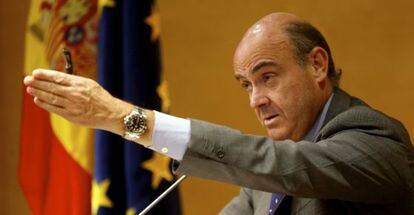Spain moderates its line against Greece after referendum ‘no’ vote
Economy chief Luis de Guindos says he wants country to remain part of the euro

The Spanish government said on Monday that Greece should do all it can to keep the euro because the single monetary unit is “an irreversible project.”
The reaction, which seemed to run counter to comments made by Prime Minister Mariano Rajoy last week, came after six out of 10 Greeks on Sunday voted to reject the conditions of the new bailout package put to them by their European partners.
On Tuesday Rajoy had stated that a euro exit would be certain for Greece in the event of a ‘no’ vote in the referendum.
We are all absolutely committed to the stability of the single currency” Spanish Economy Minister Luis de Guindos
But speaking at an economic affairs ministerial meeting in Madrid, Economy Minister Luis de Guindos moderated the government’s position towards the Athens government.
“We are all absolutely committed to the stability of the single currency,” he said, adding that Spain was open to discussing a third bailout package for Greece among its European partners, who are scheduled to meet at a summit on Tuesday.
De Guindos said Greece had “all the right in the world” to ask for a new rescue package even though Germany had announced that it would not support another bailout if Athens did not accept the conditions from previous negotiations.
The minister admitted that the ‘no’ vote made “things more difficult,” but added that the irreversibility of the euro was a fundamental matter and one of the basic principles of the euro zone.
Spanish stock market loses ground on Greek “no” vote
The clear “no” victory in the Greek referendum on Sunday triggered losses in the financial markets. On Monday, the Spanish blue-chip Ibex 35 closed down 2.22% after fluctuating in negative terrain throughout the session.
Only Indra and Aena shares rose on Monday, while Bankia, ACS, ArcelorMittal, BBVA and FCC all sustained losses of more than 3%.
Meanwhile, the gap between Spanish and German 10-year borrowing costs rose by 18 basis points to reach 160 basis points.
Although the direct economic effects of a hypothetical “Grexit” would be possible to handle, at least in theory, the wave of consequences for other European Union member states is difficult to predict.
Pablo Iglesias, secretary general of Spain’s anti-austerity Podemos party, welcomed De Guindos’ words, saying the economy minister had said “very reasonable things” about the future for a Greek agreement.
Iglesias on Monday also took the opportunity to remind the Spanish Socialist Party (PSOE) that the Greek people had given their full support to the government of Alexis Tsipras.
The comments came in reaction to statements made last week by the PSOE’s economic affairs advisor Jordi Sevilla, who described the referendum as “surreal” and asked the Greeks not to turn their back on Europe.
“Today is a good day for the PSOE to reflect,” Iglesias said.
Socialist leader Pedro Sánchez again on Monday asked the Tsipras government to show some “loyalty” to its European partners and end its “confrontations” with other members over its finances.
But Iglesias predicted that the “no” vote would give Greece more strength in the coming days to reach a deal with its creditors.
“I’m very optimistic, I’m sure that in the next few days we'll have an agreement,” Iglesias said at a news conference, adding that he was expecting to speak with Tsipras later on Monday.
Podemos is one of the closest allies of Tspiras’ Syriza party. Asked whether the outcome of the Greek vote would be good for his party in the upcoming Spanish general election, Iglesias said “it was good for the people.”
Sánchez, the Socialist leader, publicly asked the European Union to show “solidarity” with Greece by drafting a public investments plan and guaranteeing its financial liquidity.
“When I speak about solidarity, I am referring to public investments in Greece and other countries that are suffering from unemployment rates surpassing 20 percent, as is the case in Spain,” he said.
For his part, De Guindos reminded reporters that Spain had lent Greece around €26 billion “out of pure and simple solidarity.”
“The reality is that Greece is not growing and it has to solve important problems in tax collecting and competitiveness. The problems are the same as they were a few days ago,” he said.
When asked about the sudden resignation of Greek Finance Minister Yanis Varoufakis following the referendum, Spain’s economy chief pointed out that it was a “personal decision” and that he had had a “good relationship” with his Greek counterpart during the six months in which they coincided at meetings in Brussels.
After announcing his departure on Monday, Varoufakis had said that he had been made aware of “a certain preference by some eurogroup participants, and assorted ‘partners’, for my ‘absence’ from its meetings.”
“He had a big media presence, which some saw as good and others saw as bad. I would prefer not to say what I think,” De Guindos said.










































